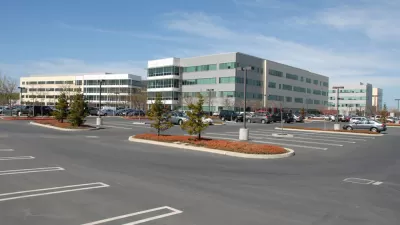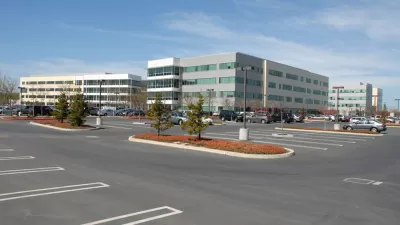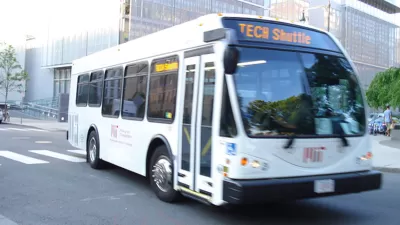Critics claim tech companies such as Apple and Google are guilty of repeating past mistakes of urban development by creating suburban campuses that isolate themselves from the surrounding community.

In an article in Collectors Weekly, Hunter Oatman-Stanford speaks with Louise Mozingo, author of the book Pastoral Capitalism: A History of Suburban Corporate Landscapes, about the history of suburban office parks and how current developments reflect some of the worst aspects of urban planning from the past. Mozingo lumps Apple's new campus in Cupertino, California, dubbed the "spaceship," into a typology of development known as pastoral capitalism. Essentially, a shift from the urban environment of the city to a more suburban style campus, surrounded by green fields and featuring lots of parking that encouraged workers to drive alone.
Even the shift to personal vehicles rather than public transit was hailed as a perk: Private cars were supposedly more reliable and allowed for more flexible work schedules, particularly in an era before highways were clogged with traffic. In actuality, this encouraged employees to extend their workday past the standard hours of nine-to-five, and helped isolated workers to ensure company loyalty. “This is something that Silicon Valley companies still do—they capture the employee for the entire day,” Mozingo says.
The isolation of workers in these campuses had negative effects on surrounding communities, as Mozingo notes. Workers who see nothing but the roads they use to commute back and forth and their coworkers in company owned building, have no investment in the improvement of the community: "If you always rely on ride-hailing apps, why would you care if the sidewalk gets cleaned or repaired?"
FULL STORY: Why Are America's Most Innovative Companies Still Stuck in 1950s Suburbia?

Maui's Vacation Rental Debate Turns Ugly
Verbal attacks, misinformation campaigns and fistfights plague a high-stakes debate to convert thousands of vacation rentals into long-term housing.

Planetizen Federal Action Tracker
A weekly monitor of how Trump’s orders and actions are impacting planners and planning in America.

In Urban Planning, AI Prompting Could be the New Design Thinking
Creativity has long been key to great urban design. What if we see AI as our new creative partner?

Chicago’s Ghost Rails
Just beneath the surface of the modern city lie the remnants of its expansive early 20th-century streetcar system.

Baker Creek Pavilion: Blending Nature and Architecture in Knoxville
Knoxville’s urban wilderness planning initiative unveils the "Baker Creek Pavilion" to increase the city's access to green spaces.

Pedestrian Deaths Drop, Remain Twice as High as in 2009
Fatalities declined by 4 percent in 2024, but the U.S. is still nowhere close to ‘Vision Zero.’
Urban Design for Planners 1: Software Tools
This six-course series explores essential urban design concepts using open source software and equips planners with the tools they need to participate fully in the urban design process.
Planning for Universal Design
Learn the tools for implementing Universal Design in planning regulations.
planning NEXT
Appalachian Highlands Housing Partners
Mpact (founded as Rail~Volution)
City of Camden Redevelopment Agency
City of Astoria
City of Portland
City of Laramie




























